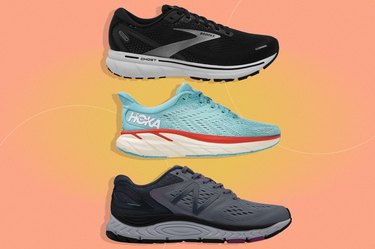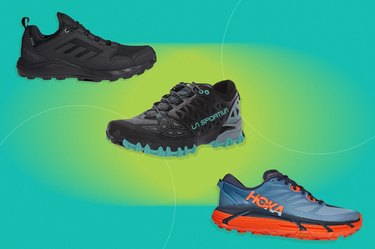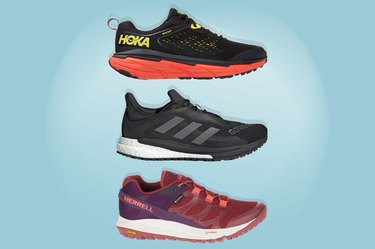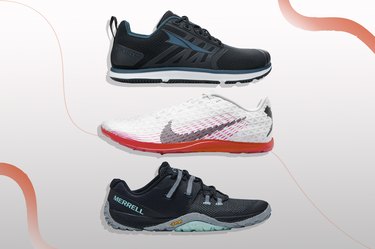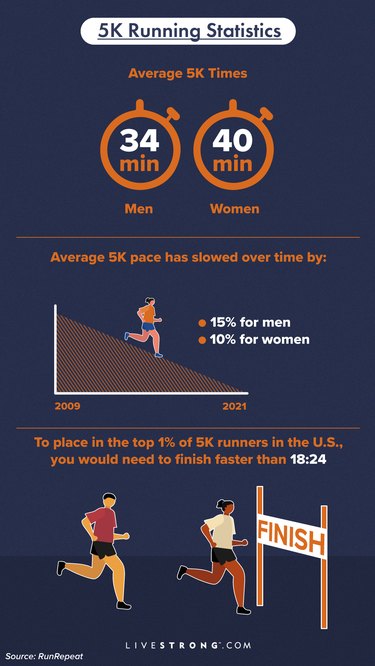
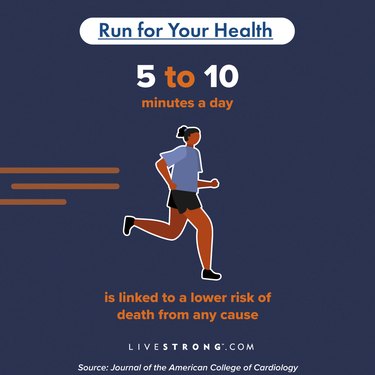
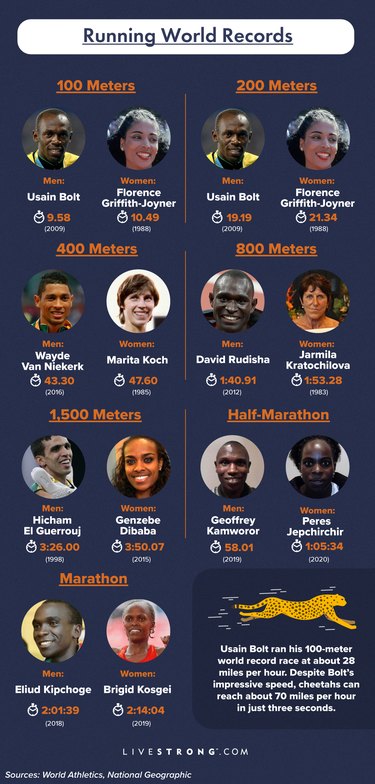
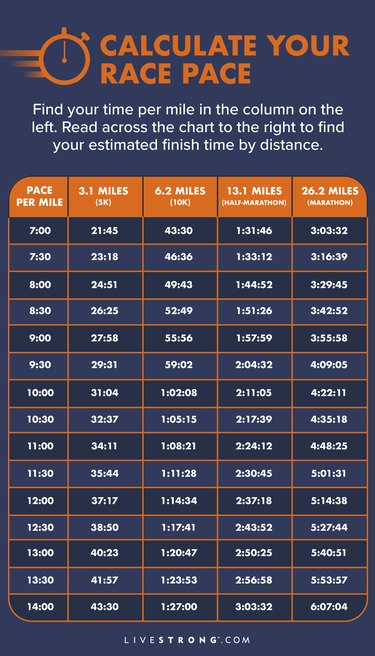

Running has been — and likely always will be — one of the most popular ways to get fit and stay active without a gym membership. In fact, since 2020, 59.1 percent of active adults say that exercising outdoors, such as running, is one of the top ways they're staying fit, per RunRepeat's Fitness Trends report.
And all that hard work is paying off. According to Strava's 2022 Year in Sport report, the amount of runners who completed a marathon nearly doubled compared to 2021.
Video of the Day
Video of the Day
So if you're one of those people lacing up their running shoes for a jog around the block (or are simply curious about those who are), here are some essential running stats you should know to keep you motivated and safe next time you're pounding the pavement.
Global Running Statistics
Even though race participation has declined around the world over the past few years, it's grown by more than 50 percent over the past decade, with runners registering for 5Ks, 10Ks, half-marathons, full marathons and more, according to a State of Running 2019 report from RunRepeat and World Athletics (formerly IAAF). (It's worth noting, this 2019 report is the most recent version.)
- About 0.5% of Ireland's population (about 24,500 people) runs races, which is the highest proportion of race runners in the world, according to the IIRM.
- About 0.2% of the Netherlands's population (about 34,600 people) races.
- About 0.2% of the United Kingdom's population (about 133,300 people) races.
- Only about 0.1% of the U.S. population (about 328,200 people) races.
- The U.S., the Philippines and South Africa have the highest proportions of 5K runners, compared to other distances, according to the IIRM.
- Norway and Denmark have the biggest proportions of 10K runners in the world, compared to other distances, according to the IIRM.
- France and the Czech Republic have the highest proportions of half-marathon runners in the world, compared to other distances, according to the IIRM.
- Switzerland has the fastest marathon runners in the world, with an average finish time of 3 hours and 50 minutes, according to RunRepeat's Marathon Statistics 2019 Worldwide report, which is the most recent version.
- The Philippines is home to the slowest marathon runners in the world, with an average finish time of 5 hours and 25 minutes.
- The fastest ultramarathon racers hail from South Africa, and they average 10 minutes and 36 seconds per mile, according to RunRepeat's The State of Ultra Running 2020 report, which is the most recent version.
- Finland has the greatest proportion of female trail runners in the world at 43%, according to the International Trail Running Association.
Running Statistics in the U.S.
About 50 million Americans (or 15 percent of the U.S. population) participate in some form of running or jogging, according to a 2022 report from Statista Research Department.
- Race participation grew 16%, according to Running USA's 2022 U.S. Running Trends Report.
- In 2019 in the U.S., the average price of a 5K was $28.22, according to Run SignUp (a platform built to help race directors organize events).
- The average price of a 10K was $36.24.
- The average price of a half-marathon was $64.35.
- The average price of a marathon was $92.45.
- Massachusetts has the fastest average marathon finish time at 4 hours and 4 minutes, according to RunRepeat's 2020 Marathon State Comparison Report.
- Washington has the second-fastest average time at 4 hours, 18 minutes and 9 seconds.
- Indiana has the third-fastest average time at 4 hours, 18 minutes and 57 seconds.
Running Statistics by Race Distance
Because the 5K (3.1 miles) is one of the shortest race distances, it's a great choice for beginners and seasoned athletes alike. So it's no surprise this distance remains the most popular road race in the U.S., according to the IIRM.
However, the half-marathon (13.1 miles) is pretty close behind. (Note: Most races typically categorize runners into female or male groups, which is why we use the terms "women" and "men" below.)
5K Race Statistics

- The most popular road race in the U.S. is the 5K, with more than 8.9 million registrants in 2022, according to Running USA.
- Annual 5K participation decreased by 13% from 2017 to 2019, despite being the most popular race, according to the IIRM.
- The average 5K time for women around the world is 40 minutes.
- The average 5K time for men around the world is 34 minutes.
- To place among the top 1% of 5K runners in the U.S., you would have to finish faster than 18 minutes and 24 seconds, according to RunRepeat.
- To place among the top 10% of 5K runners in the U.S., you would need to finish faster than 24 minutes.
- Out of all race distances, 5K runners around the world have the slowest average pace per mile, or mile split, as this is the most common beginner-level race, according to the IIRM.
- Average 5K race times have gradually slowed down, according to RunRepeat.
- The average men's 5K pace has slowed by 15.9% since 2009.
- The average women's 5K pace has slowed by 10% since 2009.
10K Race Statistics
- There were about 1.8 million global participants in 10K (6.2 miles) races in 2019, according to the IIRM.
- The average 10K time for women worldwide is 1 hour and 14 minutes.
- The average 10K time for men around the world is 1 hour.
- To place among the top 1% of 10K runners in the U.S., you would have to finish faster than 36 minutes and 37 seconds, according to RunRepeat.
- To place among the top 10% of 10K runners in the U.S., you would need to finish faster than 47 minutes and 17 seconds.
Half-Marathon Race Statistics
- Globally, there were about 2.1 million half-marathon participants in 2019, according to the IIRM.
- The average half-marathon time for women around the world is 2 hours and 15 minutes.
- The average half-marathon time for men around the world is 1 hour and 48 minutes.
- To place among the top 1% of half-marathon runners in the U.S., you would have to finish faster than 1 hour and 10 minutes, according to RunRepeat.
- To place among the top 10% of half-marathon runners, you would need to finish faster than 1 hour and 31 minutes.
Marathon Race Statistics
- There were about 1.1 million marathon (26.2 miles) participants globally in 2019, according to the IIRM.
- Less than 1% of the population in the U.S. has completed a marathon, according to RunRepeat.
- The average marathon time for women worldwide is 4 hours and 45 minutes.
- The average marathon time for men worldwide is 4 hours and 30 minutes.
- To place among the top 1% of marathon runners in the U.S., you would have to finish faster than 2 hours and 49 minutes, according to RunRepeat.
- To place among the top 10% of marathon runners in the U.S., you would need to finish faster than 3 hours and 24 minutes.
According to Runner's World, a leading running magazine, these are some of the world's top marathons and the average finish time:
Top Marathons in the World
Race | Average Finish Time |
|---|---|
1. Big Sur Marathon | 4:40:43 |
2. Los Angeles Marathon | 5:20:10 |
3. Baystate Marathon | 3:58:51 |
4. Eugene Marathon | 4:02:04 |
5. Kauai Marathon | 5:23:39 |
6. Berlin Marathon | 4:11:30 |
7. Banff Marathon | 4:48:47 |
8. California International Marathon | 4:05:55 |
9. Medoc Marathon | 6:14:00 |
Ultramarathon Race Statistics
- Ultramarathon races cover distances beyond 26.2 miles, such as 50 and 100 miles. Ultramarathon running has increased in popularity by about 345% over the last 10 years, according to RunRepeat.
- On average, 23% of ultra runners are women, compared to 14% 23 years ago.
- Women are actually 0.6% faster than men in races longer than 195 miles. For all other distances, men are faster than women.
- Across age groups, most ultra runners run at a pace of about 14 minutes and 40 seconds per mile.
Trail Running Statistics
- There are about 1.77 million trail runners around the world, according to the International Trail Running Association.
- There are more than 25,000 trail races (races of varying distances held on unpaved surfaces) worldwide each year.
- About 77% of trail runners are men and 23% are women.
- The percent of women trail runners has increased from 18% in 2013 to 26% in 2019.
- A stark majority — 90% — of trail runners are between the ages of 25 and 55.
Take a look at the 5K, 10K, half-marathon and marathon times chart below to help you estimate your race pace.

Running Statistics by Age
Running is a great activity for all ages and fitness levels, but younger doesn't necessarily mean faster. Generally, runners between the ages of 30 to 50 years old are the fastest on the road, according to the IIRM.
- The average running age is getting older, from 35 in 1986 to 39 in 2019, according to the IIRM.
- The average age for 5K runners is 40.
- The average age for 10K runners is 39.
- The average age for half-marathon runners is 39.
- The average age for marathon runners is 40.
- Consistently, runners over the age of 70 have the slowest reported finish times, across race distances.
- The fastest marathon finishers are within the 30- to 50-year-old age bracket.
- Half-marathon runners perform their best when they are between 35 and 39 years old, according to an October 2017 Research in Sports Medicine study, which analyzed runners between 2010 and 2016 in the world's largest half-marathon in Sweden.
- Generally, women achieved their best half-marathon performance at an earlier age than men.
- Peak marathon performance among women occurs at the age of 32, whereas for men, peak marathon performance occurs at the age of 34, according to a June 2019 International Journal of Environmental Research and Public Health study.
- For 50K (31-mile) ultramarathon races, peak performance for women happens around 40, whereas, for men, peak ultramarathon time is generally seen at the age of 39, according to a March 2018 Open Access Journal of Sports Medicine study.
- Only about 16.9% of endurance racers were under the age of 18 in 2018, according to Run Signup. Here's a breakdown by age:
- Between 18 and 29: 17.8%
- Between 30 and 39: 23.3%
- Between 40 and 49: 20.1%
- Between 50 and 59: 13.6%
- Between 60 and 69: 5.8%
- Over 70: 1.5%
- The oldest person ever to run a marathon is Fauja Singh, who ran the Toronto Marathon in 2011 at 100 years old, according to the Associated Press.
Running Statistics by Sex
As Beyoncé says, "Who runs the world? Girls." In 2018 — for the first time in history — women outnumbered men in races, with 50.24 percent of runners identifying as female, according to the RunRepeat's 2019 State of Running. That's up from less than 20 percent in 1986.
- Both men and women (which is how this report categorized gender) run their fastest during half-marathon races, according to the IIRM.
- The average 5K pace is 7 minutes and 4 seconds per kilometer for men and 8 minutes and 18 seconds for women.
- The average 10K pace is 5 minutes and 51 seconds per kilometer for men and 6 minutes and 58 seconds for women.
- The average half-marathon pace is 5 minutes and 40 seconds per kilometer for men and 6 minutes and 22 seconds for women.
- The average marathon pace is 6 minutes and 43 seconds per kilometer for men and 7 minutes and 26 seconds for women.
- Generally, women tend to start and stop racing earlier in life. The median age of female runners is about 36, according to the IIRM.
- Male race participation usually peaks around 40 years old.
- Nearly 60% of 5K participants are women, according to the IIRM.
- Iceland has the highest percentage of female racers in the world.
- The U.S. has the second-highest, at 58%.
- About 75% of female runners run or jog for 4 or more hours each week.
- About 79% of male runners run or jog for 4 or more hours each week.
- About 54% of female runners have completed at least one marathon.
- About 68% of male runners have completed at least one marathon.
Running Groups That Promote Diversity
Information on running demographics around race and ethnicity is limited. These organizations are working to make the sport more inclusive.
Professional Running Statistics
Identifying the fastest runners in the world can be challenging because there are many different types of athletes who excel at a variety of distances. For example, sprinters run at faster paces for shorter distances than marathoners. These are the current records in professional running today.

Men's Running Records
- Usain Bolt holds the current 100-meter sprint record at 9 seconds and 58 milliseconds, according to World Athletics.
- Bolt also holds the current 200-meter sprint record at 19 seconds and 19 milliseconds.
- Wayde Van Niekerk holds the current 400-meter sprint record at 43 seconds and 3 milliseconds.
- David Rudisha holds the current 800-meter record at 1 minute, 40 seconds and 91 milliseconds.
- Hicham El Guerrouj holds the current 1,500-meter record at 3 minutes, 26 seconds.
- Jacob Kiplimo holds the current half-marathon record at 57 minutes and 31 seconds.
- Eliud Kipchoge holds the current marathon record at 2 hours, 1 minute and 39 seconds.
The Fastest Man in the World vs. a Cheetah
Often considered the fastest man in the world, Usain Bolt ran his 100-meter world record race at about 28 miles per hour. Despite Bolt's impressive speed, cheetahs can reach about 70 miles per hour in just 3 seconds (that's faster than a sports car can accelerate), according to National Geographic.
Women's Running Records
- Florence Griffith-Joyner holds the current 100-meter sprint record at 10 seconds and 49 milliseconds, according to World Athletics.
- Griffith-Joyner also holds the current 200-meter sprint record at 21 seconds and 34 milliseconds.
- Marita Koch holds the current 400-meter sprint record at 47 seconds and 60 milliseconds.
- Jarmila Kratochilova holds the current 800-meter record at 1 minute, 53 seconds and 28 milliseconds.
- Faith Kipyegon holds the current 1,500-meter record at 3 minutes, 49 seconds and 11 milliseconds.
- Letesenbet Gidey holds the current half-marathon record at 1 hour, 2 minutes and 52 seconds.
- Brigid Kosgei holds the current marathon record at 2 hours, 14 minutes and 4 seconds.
Pro Running Earnings
- The prize for winning the Open Division of the Boston Marathon (male and female) is $150,000, according to the Boston Athletic Association.
- The second-place prize of the Open Division of the Boston Marathon is $75,000.
- The third-place prize of the Open Division of the Boston Marathon is $40,000.
- The prize for winners (male and female) of the TCS New York City Marathon is $100,000, according to the New York Road Runners.
- The prize for winners (male and female) of the Chicago Marathon is $100,000, according to the Chicago Tribune.
Historic Running Firsts
- Although it's not an official record, as it didn't meet open marathon requirements, Eliud Kipchoge was the first runner to run a sub-2 hour marathon in 2019, according to ESPN.
- Roger Bannister was the first man to run a mile under 4 minutes, with a time of 3 minutes and 59 seconds in 1954, according to Guinness World Records.
- Mary Decker was the first woman to run a mile under 4 minutes and 20 seconds, with a time of 4 minutes and 17 seconds in 1980.
- Violet Piercy was the first woman recognized by the International Association of Athletics Federations to run a marathon with a time of 3:40:22, according to Runner's World.
- Kathrine Switzer was the first woman to officially run the Boston Marathon in 1967, according to Switzer's website.
- In 2017, Shalane Flanagan became the first American woman to win the NYC Marathon in 40 years, according to the New York Road Runners.
- In 2018, Desiree Linden became the first American woman to win the Boston Marathon since 1985, according to PBS News Hour.
Running Health Statistics

It's probably no surprise that running has some great health benefits. Even just a little bit of running each week makes a difference.
- Running 5 to 10 minutes each day is associated with a reduced risk of early death from all causes and cardiovascular disease, according to an August 2014 Journal of the American College of Cardiology study.
- Even people who ran fewer than 50 minutes a week were less likely to die from heart disease compared to people who didn't run at all, according to an April 2013 American Journal of Epidemiology study.
- For a 155-pound person, running at a 12-minute-per-mile pace burns about 298 calories in 30 minutes, according to Harvard Health Publishing.
- Running at an 8-minute pace per mile burns about 465 calories in 30 minutes.
Running Injury Statistics
- At least 50% of regular runners get injured each year, according to Yale Medicine.
- Despite new shoe technology, the frequency of running injuries hasn't seen a significant shift over the past 40 years, according to an October 2015 British Journal of Sports Medicine study.
- The majority of running-related injuries occur in knees, according to a March 2019 Journal of Sports Science and Medicine study.
- Women tend to suffer more running-related knee injuries than men.
- According to the Cleveland Clinic, the most common running injuries include:
Running Shoe Statistics
Although ads may make it seem like you should change up your running shoes every time a new model releases, you probably only need to purchase a new pair every 500 miles or so, according to Fleet Feet, a running store with over 250 locations in the U.S.
Next time you shop, keep the top running shoe brands (and their best shoes) of 2023 in mind:
- Asics
- Hoka
- Mizuno
- New Balance
- 840v5 ($139.99, New Balance [men's], New Balance [women's])
More Running Shoes to Shop
- Sports and Fitness Industry Association: "Running/Jogging Participation Report 2020"
- Run SignUp: "Race Trends Annual Industry Report 2019"
- Running USA: "Running USA Releases 2019 U.S. Running Trends Report"
- RunRepeat: "Compare Running Finish Times"
- RunRepeat: "Who’s Faster? The Ultimate State Comparison for Marathons"
- RunRepeat: "The State of Ultra Running 2020"
- International Trail Running Association: "Trail Running Infographics"
- Research in Sports Medicine: "Sex- and Age-Related Differences in Half-Marathon Performance and Competitiveness in the World’s Largest Half-Marathon – the GöteborgsVarvet"
- International Journal of Environmental Research and Public Health: "The Age-Related Performance Decline in Marathon Running: The Paradigm of the Berlin Marathon"
- Open Access Journal of Sports Medicine: "Age of Peak Performance in 50-km Ultramarathoners – Is It Older Than in Marathoners?"
- RaceTrends: "Annual Statistical Report"
- RunRepeat: "133 Stats on 5K Running Races in the US"
- US Legal: "Professional Athlete Law and Legal Definition"
- BAA: "Prize Money"
- NYRR: "Jepkosgei, Kamworor Win TCS New York City Marathon"
- Chicago Tribune: "10 Things to Know About the 2018 Chicago Marathon"
- World Athletics: "Men's 100M"
- World Athletics: "Women's 100m"
- Runner's World: "A History of Women's Running"
- New York Road Runners: "Shalane Flanagan"
- ESPN: "Eliud Kipchoge Runs first Ever Sub-Two Hour Marathon in INEOS 1:59 Challenge"
- PBS News Hour: "Desiree Linden Becomes First American Woman to Win Boston Marathon in More Than 30 Years"
- Journal of the American College of Cardiology: "Leisure-Time Running Reduces All-Cause and Cardiovascular Mortality Risk"
- Medicine and Science in Sports and Exercise: "A 45-minute Vigorous Exercise Bout Increases Metabolic Rate for 14 Hours"
- Yale Medicine: "Running Injuries"
- British Journal of Sports Medicine: "Running Shoes and Running Injuries: Mythbusting and a Proposal for Wwo New Paradigms: ‘Preferred Movement Path’ and ‘Comfort Filter’"
- BMC Research Notes: "Are Old Running Shoes Detrimental to Your Feet? A Pedobarographic Study"
- Runner's World: "Best Running Shoes 2021: the Best Men's and Women's Running Trainers, Tested in the Lab and on the Road"
- RunRepeat: "Fitness Trends: Achieving Fitness Goals in 2021 vs. 2020"
- World's Marathons: The Big 5 - Make Your New Goal One Or All
- Runner's World: "The World's Top 10 Marathons"
- Runner's World: "World's Oldest Marathoner Runs His Last Race
- World Athletics: "World Records"
- National Geographic: "Cheetahs 101"
- Katherine Switzer: "The Real Story"
- Cleveland Clinic: "The 6 Most Common Running Injuries (Plus How to Treat Them)
- Journal of Sports Science and Medicine: "The Proportion of Lower Limb Running Injuries by Gender, Anatomical Location and Specific Pathology: A Systematic Review"
- Associated Press: "Fauja Singh, 101, finishes last race"
- Guinness World Records: "Roger Bannister: First sub-four-minute mile"
- Strava: "2022 Year in Sport"
- Statista Research Department: "Number of running and jogging participants in the United States from 2010 to 2021"
- Running USA: "2022 Race Trends Report"
- Fleet Feet: "How Long Do Running Shoes Last?"
- RunRepeat.com: "The State of Running 2019"
- American Journal of Epidemiology: "Longevity in Male and Female Joggers: The Copenhagen City Heart Study"
